|
Claude Roger Marx
J.E. LABOUREUR 1877-1943 Peintures Aquarelles Estampes Livres illustrés. Mai 1951
Librairie Norberg 1951 brochure agrafée non paginée (16 pages) - Catalogue tiré à 1000 exemplaires sur Vergé suédois, celui-ci n° 91, publié à l'occasion de l'exposition [ ... aux murs de la Librairie Eliane Norberg, et dans son éclat, une ouvre toute d'allégresse, de fantaisie et d'ingéniosité ... ] après la mort de Laboureur. 131 numéros à ce catalogue. Certains numéros sont cochés, d'autre précédés d'un point d'interrogation, le tout au crayon de papier.
Ссылка продавца : EB7-38

|
|
|
Claude Roger Marx
J.E. LABOUREUR 1877-1943 Peintures Aquarelles Estampes Livres illustrés. Mai 1951
Librairie Norberg 1951 brochure agrafée non paginée (16 pages) - Catalogue tiré à 1000 exemplaires sur Vergé suédois, celui-ci n° 91, publié à l'occasion de l'exposition [ ... aux murs de la Librairie Eliane Norberg, et dans son éclat, une ouvre toute d'allégresse, de fantaisie et d'ingéniosité ... ] après la mort de Laboureur. 131 numéros à ce catalogue. Certains numéros sont cochés, d'autre précédés d'un point d'interrogation, le tout au crayon de papier.
Ссылка продавца : EB7-38

|
|
|
Raymond Charmet Claude Roger Marx
IRA Moskowitz
New York Shorewood 1966 New York - Shorewood Publishers - 1966- Grand In4 ( 35 x 29 cm ) - Texte en Anglais .Cartonnage de l'éditeur avec sa jaquette - Nombreux défauts a la jaquette - mouillure au 4e plat du cartonnage - 8 pages de texte et 63 planches hors texte en noir et blanc ou couleur - Une lithographie signée par l'artiste en frontispice - Envoi autographe signé d'Ira Moskowitz en page de garde a Raymond Charmet .
Ссылка продавца : 120Dk

|
|
|
Raymond Charmet Claude Roger Marx
IRA Moskowitz
New York Shorewood 1966 New York - Shorewood Publishers - 1966- Grand In4 ( 35 x 29 cm ) - Texte en Anglais .Cartonnage de l'éditeur avec sa jaquette - Nombreux défauts a la jaquette - mouillure au 4e plat du cartonnage - 8 pages de texte et 63 planches hors texte en noir et blanc ou couleur - Une lithographie signée par l'artiste en frontispice - Envoi autographe signé d'Ira Moskowitz en page de garde a Raymond Charmet .
Ссылка продавца : 120Dk

|
|
|
Collectif
Les artistes de Metz et de Moselle - Exposition - Catalogue Noel 1932
Le Messin 1932 In4 ( 26 x 20 cm ) - En feuilles sous chemise illustrée - Micro déchirures a la chemise - Bien complet des 16 reproductions des oeuvres des artistes suivant : Jean Louis Archimbaud Léo Bardollet Roger Berrier Georges Collignon Dolisy François Heigel Clément Kieffer Augustin Lézer Ferdinand Marx ( père et fils ) Germaine Nassoy Calixte Remy Roseline Teitgen Jean Thiriot Henry Thiry Wladimir Wechtomoff - Toutes signées a la main sauf 2 - Contient également le catalogue complet de l'exposition - Rare
Ссылка продавца : 256Fu

|
|
|
Collectif
Les artistes de Metz et de Moselle - Exposition - Catalogue Noel 1932
Le Messin 1932 In4 ( 26 x 20 cm ) - En feuilles sous chemise illustrée - Micro déchirures a la chemise - Bien complet des 16 reproductions des oeuvres des artistes suivant : Jean Louis Archimbaud Léo Bardollet Roger Berrier Georges Collignon Dolisy François Heigel Clément Kieffer Augustin Lézer Ferdinand Marx ( père et fils ) Germaine Nassoy Calixte Remy Roseline Teitgen Jean Thiriot Henry Thiry Wladimir Wechtomoff - Toutes signées a la main sauf 2 - Contient également le catalogue complet de l'exposition - Rare
Ссылка продавца : 256Fu

|
|
|
Tristram Hunt
Engels - Le gentleman révolutionnaire
Paris Le grand livre du mois 2009 Grand et fort In8 - broché - 587 pages - un cahier photographique
Ссылка продавца : 127Dh
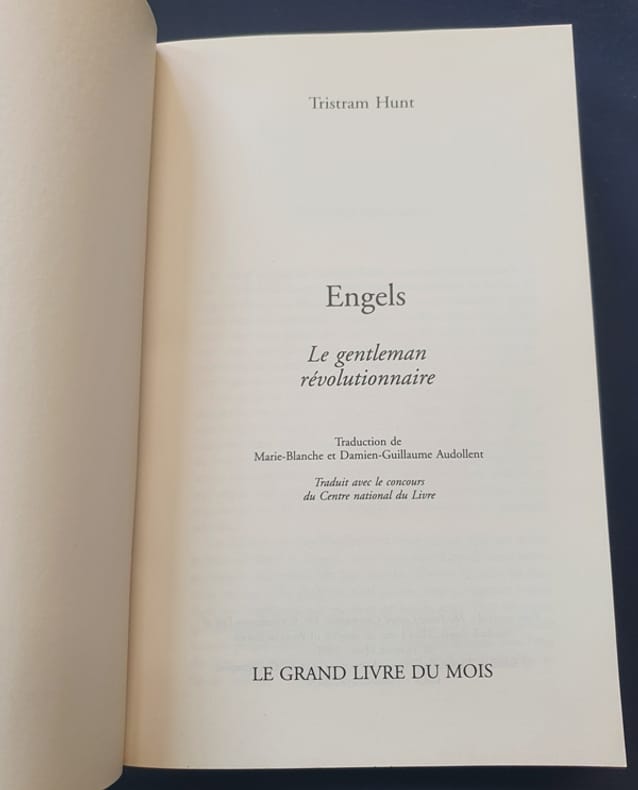
|
|
|
Tristram Hunt
Engels - Le gentleman révolutionnaire
Paris Le grand livre du mois 2009 Grand et fort In8 - broché - 587 pages - un cahier photographique
Ссылка продавца : 127Dh

|
|
|
Magdeleine Marx
C'est la lutte finale ... ( six mois en Russie Soviétique )
Paris Flammarion 1923 In12 - broché - 260 pages - papier jauni - signé par l'autrice avec nom du dédicataire coupé
Ссылка продавца : Zp211
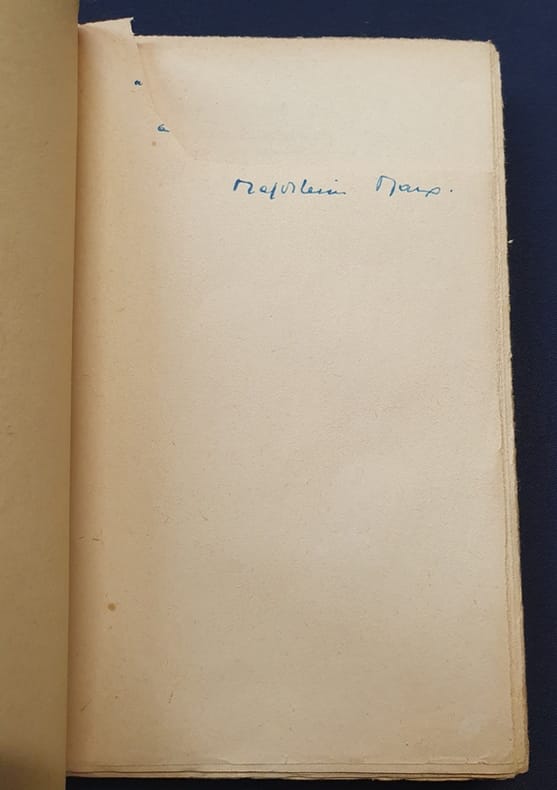
|
|
|
Magdeleine Marx
C'est la lutte finale ... ( six mois en Russie Soviétique )
Paris Flammarion 1923 In12 - broché - 260 pages - papier jauni - signé par l'autrice avec nom du dédicataire coupé
Ссылка продавца : Zp211

|
|
|
Paul Lafargue ; Wilhelm Liebknecht ; Friedrich Lessner ; Eleanor Marx-Aveling ; George Julian Harney ; Georg Weerth ; Friedrich Albert Sorge ; Guerman Lopatine ; Theodore Cuno ; August Bebel ; Jenny Marx ; Docteur Edgar Longuet ; P. Annenkov ; Franziska Kugelmann ; Anselmo Lorenzo ; Kovalevski ; Morozov ; Ernest Belfort Bax ; Edward Aveling ; Roussanov ; Voden ; Kravtchinskaïa ; Franz Mahring :
Souvenirs sur Marx et Engels. Traduit du russe par A. Roudnikov et R. Rodov.
1950 Moscou, Editions en Langues Etrangères, sans date (circa années 1950) ; in-8, pleine percaline havane, titre doré au dos et sur plat ; 381 pp. , 36 pp. , (2) pp. , 24 planches de portraits en noir et blanc à pleine page hors-texte, 15 illustrations in-texte. exemplaire en bon état.
Ссылка продавца : 10990
|
|
|
Roger Marx. Héliotypies de Léon Marotte.
Auguste Rodin Céramiste Paris Société de propagation des livres d'art. 1907, Demi-reliure, 1/600 ex. numérotés. 46 pages de texte.18 planches en héliotypies. Un accroc en marge de la page 18, n'affectant pas le texte
1907 Paris Société de propagation des livres d'art. 1907,i, broché, n 1/600 ex. numérotés.( 46 pages de texte.18 planches en héliotypies. certaines contrecollées) joint texte Roger Marx pour expo de 1846 Galerie Jean de Ruaz
Ссылка продавца : 13761
|
|
|
"MARX, KARL (+) FRIEDRICH ENGELS (+) D. B. RIAZANOV (+) HAYIM HOLMSHTOK (+) M. LEVITAN.
Komunistisher Manifest [i.e. ""Communist Manifesto]. - [COMMUNIST MANIFESTO IN YIDDISH]
Moskve [Moscow], Tsentraler Farlag Far Di Felker Fun F. S. S. R., 1924. 16mo. With the original front wrapper (lacking spine and back wrapper). With previous owner's name to front wrapper (Henoch Gelernt). Front wrapper and last leaf with a few nicks, otherwise fine and clean. 181, (3) pp.
Ссылка продавца : 53496
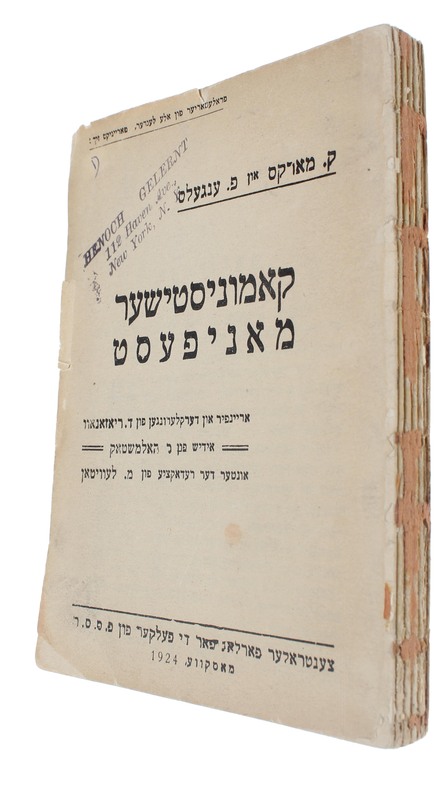
|
|
|
"MARX, KARL (+) FRIEDRICH ENGELS.
Komunisticni manifest. [i.e. ""The Communist Manifesto""]. - [EXCEEDINGLY RARE UNDERGROUND SLOVENIAN TRANSLATION OF THE COMMUNIST MANIFESTO]
[Slovene Littoral, Printed for Agitprop, Presumably 1944]. Small4to. In the original stapled printed grey wrappers. Previous owner's name in light pencil to front wrapper and title-page. A few brown spots to title-page, otherwise a very fine and clean copy. 52 pp.
Ссылка продавца : 54613
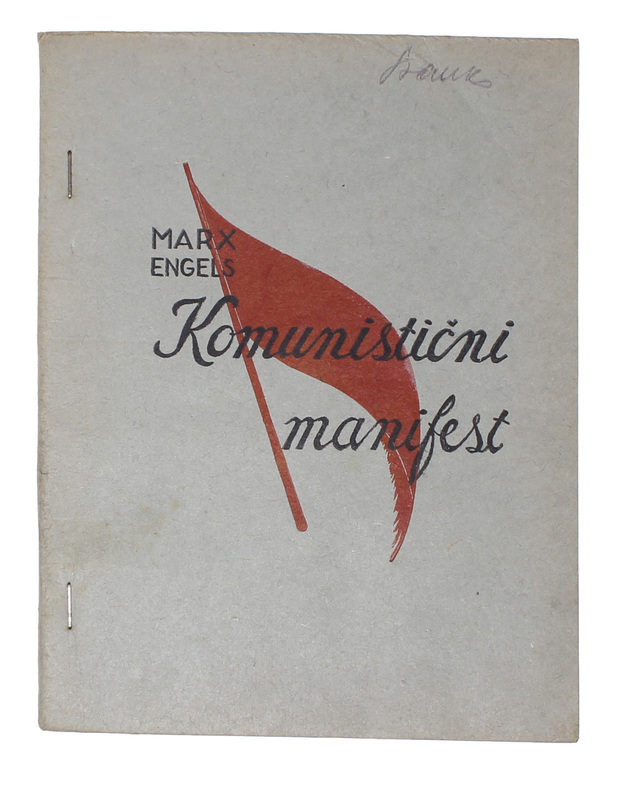
|
|
|
"MARX, KARL.
Pääoma. Kansantaloustieteen arvostelu Ensimäinen nide Ensimäinen kirja: Kapitalistinen tuotanto Alkuperäisen teoksen kuudennesta painoksesta suomentanut O. W. Louhivuori. (i.e. Finnish ""Das Kapital""). - [FIRST FINNISH TRANSLATION OF 'DAS KAPITAL']
Helsinki, Työväen Kirjapaino, 1918. 8vo. In publisher's original red cloth, with gilt lettering. Wear to extremities. Gilting on spine almost gone. Hindges very weak, book block almost detached from binding. Internally fine and clean. (4), XX, 712, (1), 79, (3) pp.
Ссылка продавца : 54737
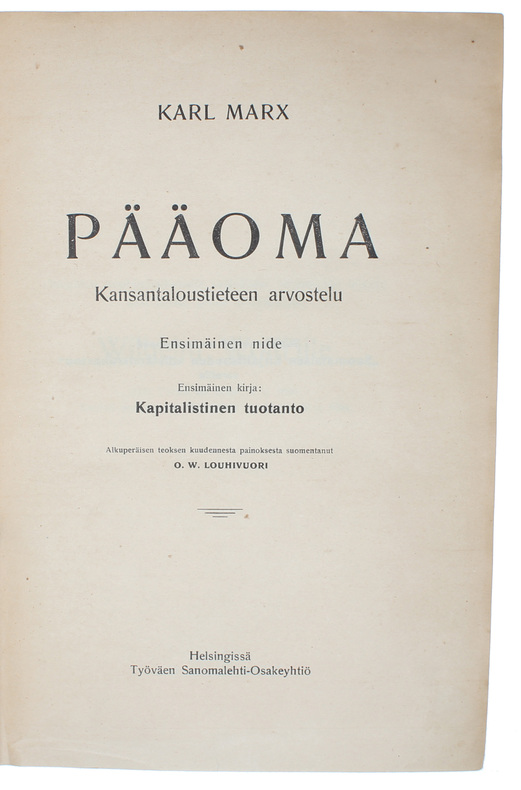
|
|
|
"MARX, KARL.
Kapital: k'aghak'atntesut'yan k'nnadatut'yun [Armenian i.e. ""Das Kapital""]. 4. vols. - [FIRST ARMENIAN TRANSLATION OF 'DAS KAPITAL']
Erevan, Kusakts'akan Hratarakch'ut'yun, 1933 - 1949. Royal8vo. 4 volumes, all in the original red (in four different nuances) full cloth with embossed title to front boards and spine. Light soiling to extremities on all four volumes expecially volume 1 with heavy soiling. Hindges a bit weak. All volumes internally fine and clean. XL,745, (3) pp." XXVII, 492, (4) pp. XXVI, 452 pp." (4), 452 pp.
Ссылка продавца : 54792

|
|
|
"MARX, CARLO. [KARL].
Il Capitale. Critica dell'economia politica. - [FIRST ITALIAN TRANSLATION OF MARX' ""DAS KAPITAL""]
Torino, Unione Tipografico-Editrice, 1886. Royal8vo. Bound in a contemporary half vellum binding with red and green title label to spine with gilt lettering and ornamentation to spine, forming six compartments. In ""Biblioteca dell'Economista"", Third Series, volume 9. wear to extremities and light brownspotting throughout, especially to first and least leaves. e copy. Il Capitale: 685 pp. [Entire volume: (4), 903, (1) pp.].
Ссылка продавца : 55015
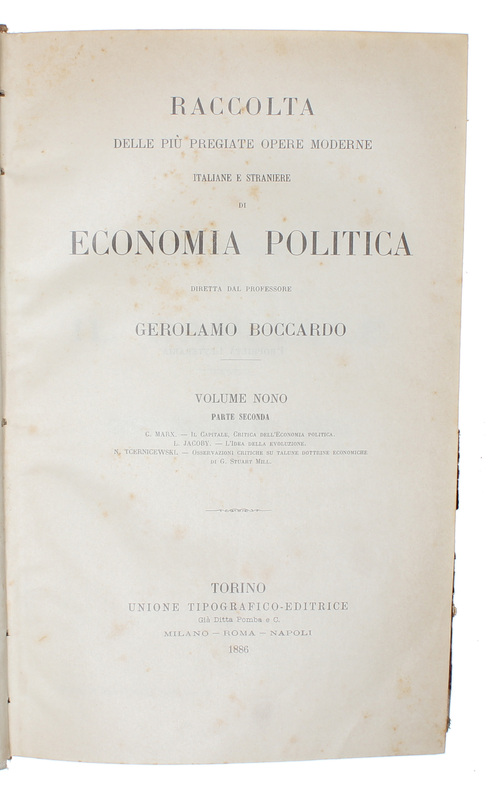
|
|
|
"MARX, KARL.
Kapitalen. 2 Dele. Første Bind. Kapitalens Produktionsproces. Oversat efter Originalens tredje Oplag. 2. Kapitalens Cirkulationsproces.Udgivet efter Forfatterens Død af Friedrich Engels. [i.e. Danish ""Das Kapital""]. - [FIRST DANISH TRANSLATION OF ""THE CAPITAL""]
København, (Copenhagen), 1885-87. 4to. In contemporary half cloth with gilt lettering to spine. Even browning as usual, due to the paper quality. An envelope pasted on to front free end-paper containing Danish articles on Marx. Previous owner's name to title-pages. A fine and clean copy with both half-titles present (""Socialistisk Bibliotek"" Vol. IV-V). Vol 1: (2), 473, (1)" Vol 2: VII-1" (4), 363, (1) pp.
Ссылка продавца : 55207
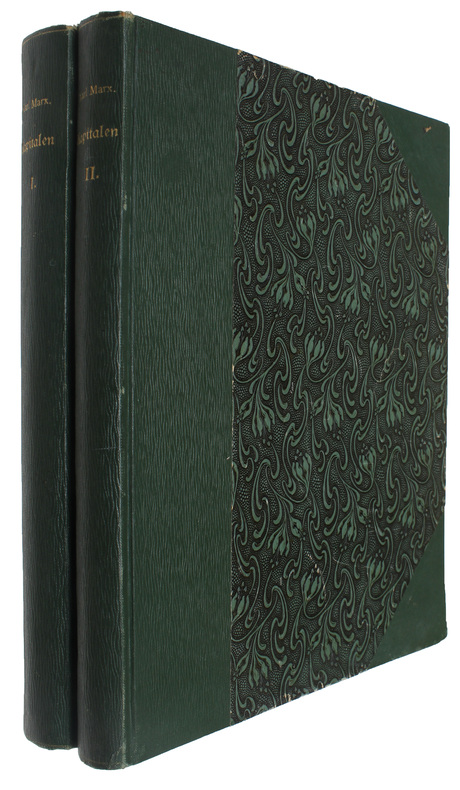
|
|
|
"MARX, KARL (+) FRIEDRICH ENGELS.
Komonistakan Partiayi Manifestë (i.e. Armenian ""The Communist Manifesto""). - [FIRST ARMENIAN TRANSLATION OF THE COMMUNIST MANIFESTO PRINTED IN ARMENIA.]
Yerevan, 1938 8vo. In the original embossed cloth binding with gilt lettering to front board. The profile of Marx and Engels embossed onto front board. Extremities a bit rubbed a underligning in text throughout. 131, (5) pp. + 4 plates (respectively showing Marx, Engels, the title-page of the Original German edition and a letter).
Ссылка продавца : 55317
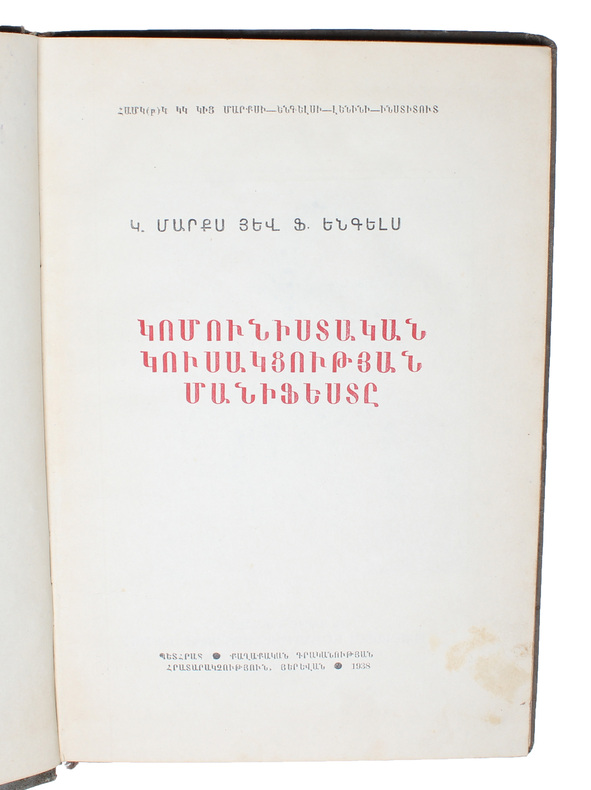
|
|
|
"MARX, KARL.
Walki klasowe we Francji 1848-1850 r. [i.e. English: ""The Class Struggles in France 1848-1850""].
Warszawa, Naklad Wincentego Raabego, 1907. 8vo. Uncut in the original printed wrappers. Wrappers with a few nicks and spine with three small holes. Internally fine and clean. (4), 182 pp.
Ссылка продавца : 55506
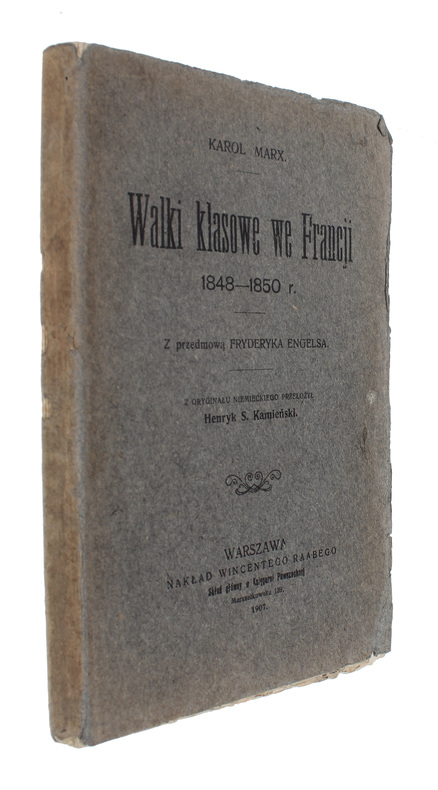
|
|
|
MARX, KARL.
Kapital. Kritika Politicke Ekonomije. 2 vols. - [THE FIRST SERBO-CROATIAN TRANSLATION OF 'DAS KAPITAL']
Beograd, Zaklada Tiskare Narodnih Novia, 1933 & 1934. Large 8vo. 2 volumes both in publisher's original embossed blue cloth. Leather title-label to both spine. Extremities with wear and hindges weak. Occassional brownspotting throughout. Last leaf (advertisement) missing outer top corner. 837, (3)" 549, (2) pp.
Ссылка продавца : 55558
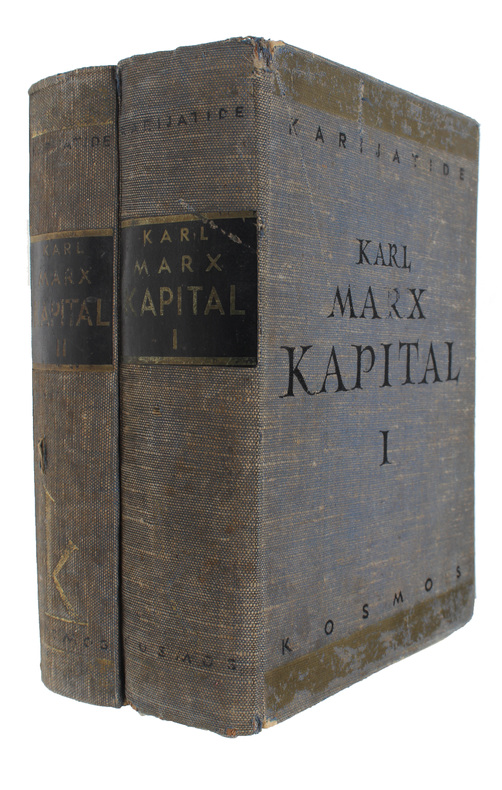
|
|
|
"MARX, CARLO. [KARL].
Il Capitale. Critica dell'economia politica. - [FIRST COMPLETE ITALIAN TRANSLATION OF MARX' ""DAS KAPITAL""]
Torino, Unione Tipografico-Editrice, 1886. Royal8vo. Bound uncut and largely unopened with the original printed wrappers in a very nice recent red half calf binding with marbled paper covered boards. Half-title and title-page browned. Published as ""Biblioteca dell'Economista"", Third Series, volume 9. An unusually fine copy. Il Capitale: 685 pp. [Entire volume: (4), 903, (1) pp.].
Ссылка продавца : 55866
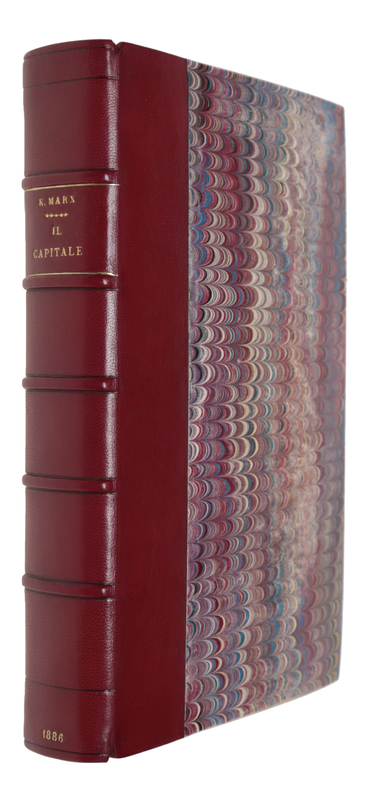
|
|
|
"MARX, KAROL (+) FRIEDRICH ENGELS.
Rewolucja i Kontrrewolucja w Niemczech. (Polish i.e. ""Revolution and Counter-Revolution in Germany""). [Bound with:] Nauki Ekonomiczne (+) Ustroj Socjalistyczny. - [FIRST POLISH TRANSLATION OF MARX'S ""REVOLUTION AND COUNTER-REVOLUTION""]
Warszawa, Bibljoteka Naukowa, 1906. Small4to. Bound in contemporary half calf with gilt lettering to spine with four raised bands. Stamp to title-pages and last leaf, otherwise fine. 277, (3), 154, (6), 51, (1) pp.
Ссылка продавца : 55908
|
|
|
"MARX, KARL.
Das Kapital. Kritik der politischen Oekonomie. Erster Band. Buch I: Der Produktionsprocess des Kapitals. - [THE NEW RELIGION - PMM 359]
Hamburg, Otto Meisner, 1867. 8vo. Nice contemporary black half calf with gilt spine. Minor wear to hinges and capitals, which have tiny, barely noticeable professional restorations. Inner hinges re-enforced. Contemporary owner's names (Emil Kirchner and Karl Kirchner (1887)) to front free end-paper. Contemporary book-plate to inside of front board (Ernst Ferdinand Kirchner). A very nice copy with just the slightest of occasional brownspotting. Housed in a very nice custom-made black full morocco box with gilt llettering to spine. XII, 784 pp.
Ссылка продавца : 56311
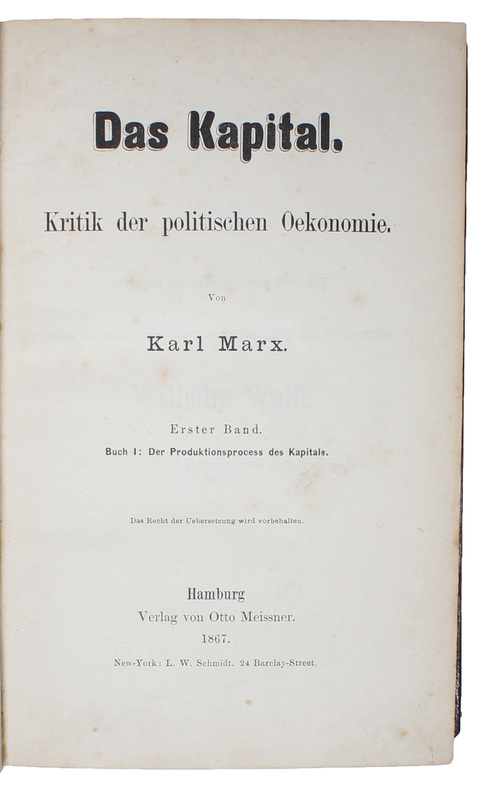
|
|
|
"MARX, KARL.
Herr Vogt. - [MARX' STRUGGLE AGAINST DEFAMATION ]
London, 1860. 8vo. Bound partly uncut with the original wrappers in a nice recent half calf pastiche binding with four rasied bands and gilt lettering to spine. Front wrapper with marginal repairs and back wrappers with repairs with minor loss of text. Light brownspotting to first and last leaves. A fine copy. VI, (2), (1)-191, (1, -errata) pp.
Ссылка продавца : 56420
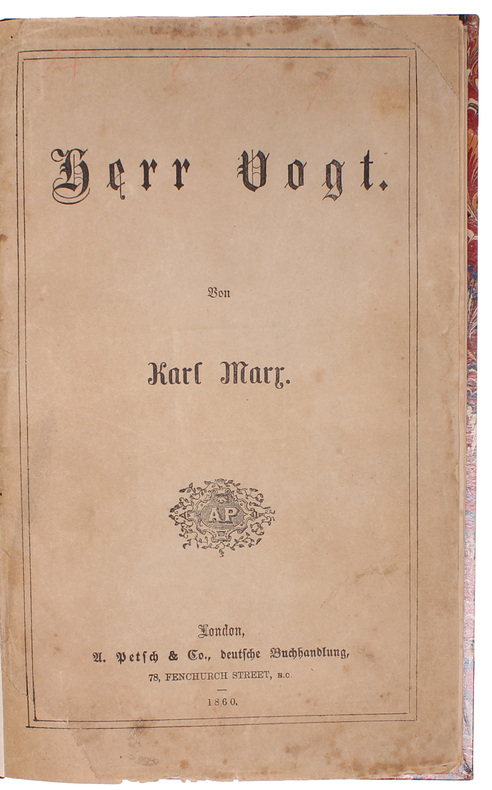
|
|
|
"MARX, KARL.
Kapitalut. Kritika na politicheskata ekonomiia. [i.e. Bulgarian ""Das Kapital""]. [Translated by Georgi Bakalov]. - [FIRST FULL BULGARIAN TRANSLATION OF MARX'S 'DAS KAPITAL']
Stara Sagora, 1910. 8vo. Contemporary half cloth with gilt lettering to spine. Spine with wear. Upper inner corner of title-page with repair, missing the 'K' in 'Karl'. Two last leaves with marginal repairs, not affecting text. Light occassional brownspots throughtout. XXX, (2), 598, (2) pp. + frontiespiece of Marx.
Ссылка продавца : 56711
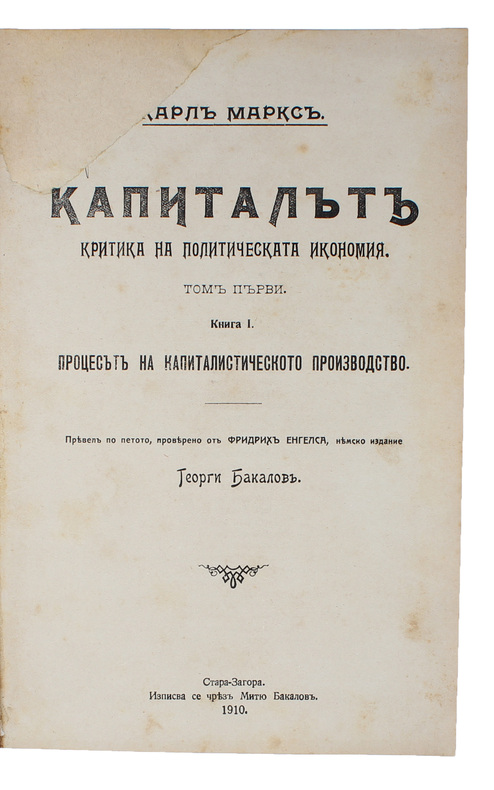
|
|
|
"MARX, KARL.
Haq-qâpîtâl: bîqqôret hak-kalkala ham-medînît, [ha-Kapital: bikoret ha-kalkalah ha-medinit], [hakapital], [i.e. Hebrew ""Das Kapital""]. 2 vols. - [FIRST HEBREW TRANSLATION OF 'DAS KAPITAL']
Yerûsalayim [Jerusalem], Sifriyyat Pôalîm, 1947 & 1954. Large8vo. Two volumes both in publisher's original printed cloth with the original dust-jackets. 763 pp."" 516 pp.Vol. 1: A bit of misolocured to spine and front board. Front dust-jacket detached from the spine and back-part. Spine lacking a third of the paper. Very fragile.Vol. 2: Upper and lower part of spine miscoloured. Dust-jacket missing upper and lower part of spine. Both volumes internally very fine and clean.
Ссылка продавца : 56712
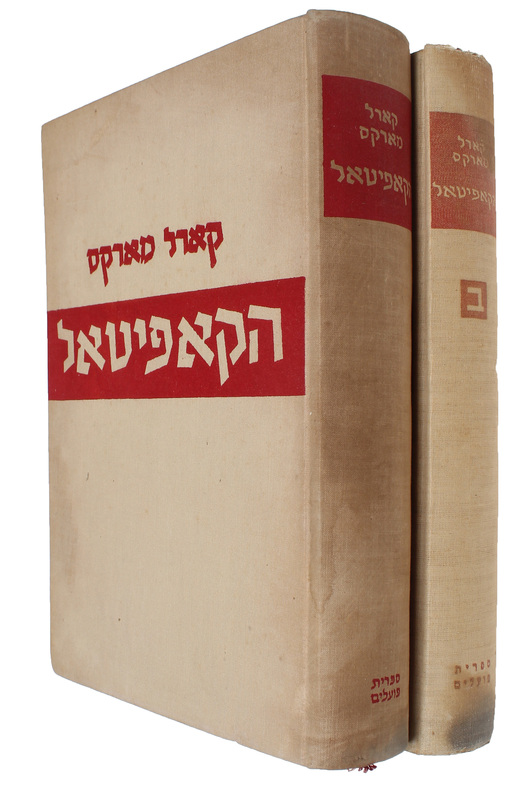
|
|
|
"MARX, KARL.
Marukusu shihonron. [i.e. Japanese ""Das Kapital""]. 5 vols. - [FIRST COMPLETE JAPANESE TRANSLATION OF MARX'S DAS KAPITAL]
Tokyo, Kaizosha, 1927-1928. Small4to. 5 volumes all in publisher's original full red cloth with gilt lettering to spine, all five volumes house the original slipcases. Free end-papers browned and only very light sporadic brownspots throughout. A very fine and clean copy.
Ссылка продавца : 56714
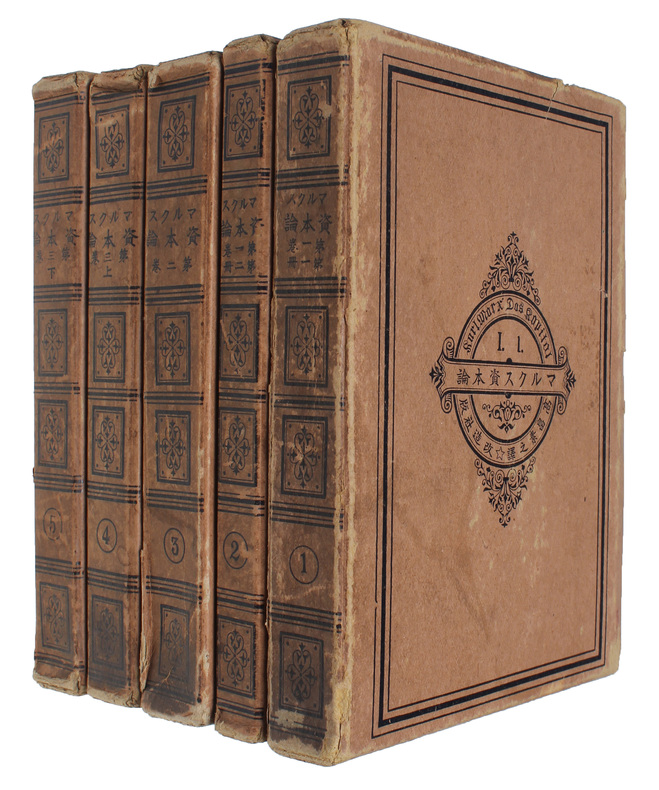
|
|
|
MARX, KARL.
Capitalul. Critica Economiei Politice. - [FIRST ROMANIAN TRANSLATION OF 'DAS KAPITAL']
[No place], Editura Partidului Comunist Roman, 1947. Royal8vo. In publisher's half cloth Binding with waterstain, affecting both front and back board. Hindges weak Internally with a few marginal annotations, othwise interanlly fine and clean. 780, (1) pp + frontispiece.
Ссылка продавца : 56933
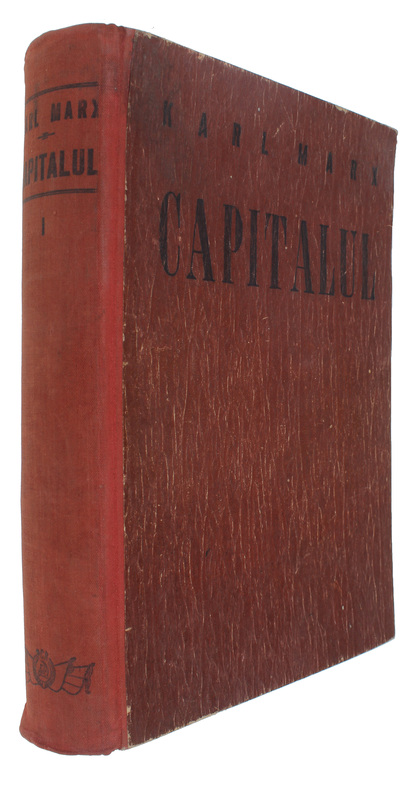
|
|
|
"[MARX, KARL], KARLA MARKSA
Kapital. Kritika Politicke Ekonomije. - [FIRST SERBIAN TRANSLATION OF MARX'S ""DAS KAPITAL""]
Beograd, Izdavacka Knjizarnica Gece Kona, 1924. 8vo. In the original printed wrappers. Spine renewed, preserving most of the original spine. Ink stain to front wrapper. Previous ower's name to top of title-page. First leaves with a few underlignings, otherwise internally fine and clean. 198, (4) pp.
Ссылка продавца : 56992
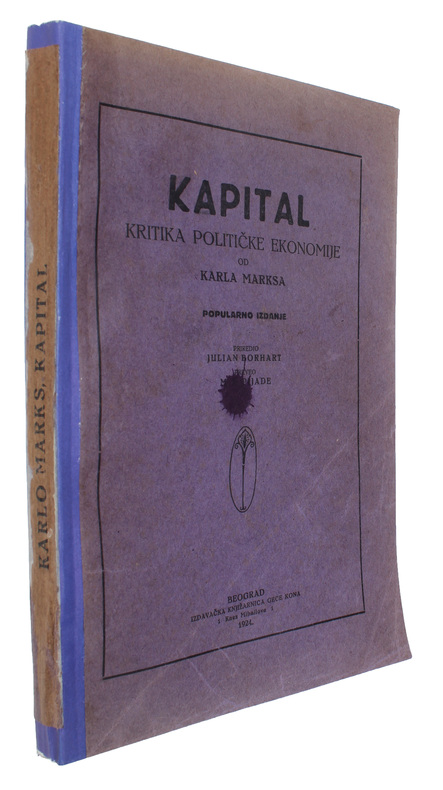
|
|
|
"MARX, KARL (FRIEDRICH ENGELS edt.).
Das Kapital. Kritik der politischen Oekonomie. Zweiter Band. Buch II: Der Cirkulationsprocess des Kapitals. Herausgeben von Friedrich Engels. - [""THE FORGOTTEN BOOK OF CAPITAL""]
Hamburg: Otto Meissner, 1885. 8vo. Very nice contemporary black half calf with gilt spine. A bit of wear to extremitoes. Inner front hinge a little weak. Title-page a littel dusty, but otherwise very nice and clean. Book-plate (Arnold Heertje) to inside of front board. XXVII, (1), 526 pp. + 1 f. With pp. 515-16 in the first state (""Consumtionsfonds"" with a C) and with the imprint-leaf at the end.
Ссылка продавца : 57044

|
|
|
"MARX, KARL (+) GABRIEL DEVILLE (+) [TRANSLATOR:] CHRISTIAN RAKOVSKY (+) ED. BERNSTEIN (+) GEORGI PLEKHANOV
Kapitalutu. [i.e. Bulgarian ""Das Kapital""] [Bound with]: Predpostavkit na sotsializma i zadachitu na sotsialnata demokratsiya [i.e. Bulgarian: ""The Preconditions of Socialism and the Tasks of Social Democracy""] (+) Marksovata Istoricheska Teoria [i.e... - [FIRST BULGARIAN EDITION OF THE MOST IMPORTANT ABRIDGED VERSION OF ""THE CAPITAL""]
Varna, 1900. 8vo. In contemporary half calf with four raised bands to spine. Extremities with wear. Frontboard missing parts of cloth. Two bands on spine missing some of the leather. Verso of front free end paper with notes in contemporary hand and previous owner's name to title-page of all three works. A few occassional marginal lignings in pencil, otherwise internally good and clean. [Predpostavkit na sotsializma i zadachitu...:] XII, 257, (1), XIV pp. [Marksovata Istoricheska Teoria:] 86, (2) pp. [Kapitalutu:] IV, (5)-284 pp.
Ссылка продавца : 57116
|
|
|
"MARX, KARL.
Kapitalut. Kritika na politicheskata ekonomiia. [i.e. Bulgarian ""Das Kapital""]. [Translated by Dimitar Blagoev] (+) Kapitalut. [Translated by Georgi Bakalov] (+) Karlu Marksu i Negovoto Vreme [i.e. Bulgarian: ""Karl Marx and his Time""]. - [THE FIRST BULGARIAN TRANSLATIONS OF MARX'S 'DAS KAPITAL']
[Blagoev-translation:] Sofia, [presumably 1910 but august 1909 stated on last leaf of preface] & [Ba [Blagoev-translation:] 8vo. In a contemporary full cloth binding with red leather title-label with gilt lettering to spine. Spine with wear and light soiling to extremities. Hindges a bit weak First 10 leaves with stain in margin, otherwise a good copy. (6), XXXI, (1), 675, (1) pp.{Bakalov-translation:] 8vo. In contemporary half calf with five raised bands and gilt lettering to spine. Wear to extremities and hindges a bit weak Repair to inner margin of title-page. Internally fine and clean. XXX, (2), 598, (2) pp. + frontiespiece of Marx. Withbound is ""Karl Marx and His Time"": (1)-180 pp.
Ссылка продавца : 57297
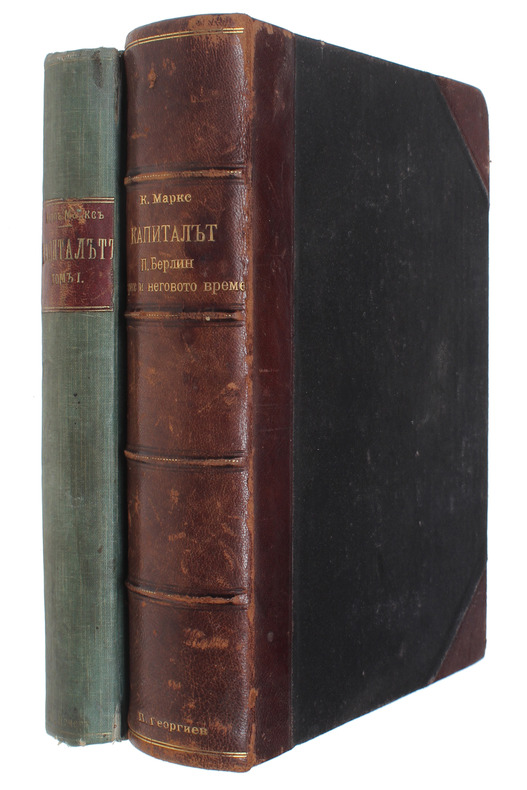
|
|
|
MARX, KARL (+) FRIEDRICH ENGELS.
Komunistièni manifest. - [EXCEEDINGLY RARE UNDERGROUND SLOVENIAN TRANSLATION OF THE COMMUNIST MANIFESTO]
[Slovenia], Agit-Prop komisija centralnega komiteta komunistiène partije Slovenije [Agitprop Commiss Small4to (110x145 mm). In the original black/red printed stapled wrappers. With a few occassional blue underlignings. 31, (1) pp.
Ссылка продавца : 57759
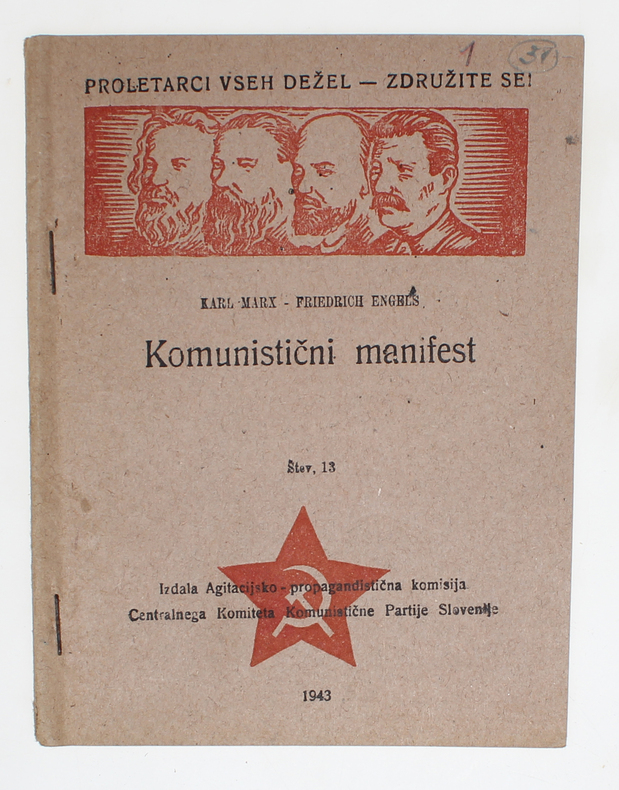
|
|
|
"MARX, KAREL [KARL].
Kapitál. Kritika Politické Ekonomie. [i.e. Czech ""Das Kapital""]. [Translated by Theodor Smeral]. - [FIRST CZECH TRANSLATION OF DAS KAPITAL]
Praze, 1913. Royal8vo. In contemporary full cloth with gilt lettering to spine. Ex-libris pasted on to front free end-paper. A few occassional underlignings in text. XXIII, (1), 619, (5) pp.
Ссылка продавца : 57764
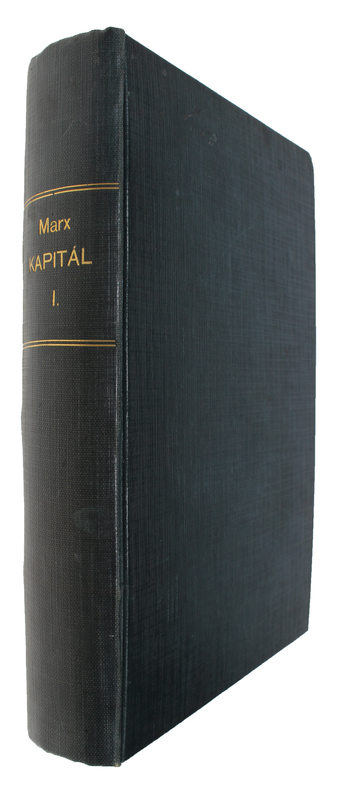
|
|
|
"MARX, KARL.
Kapital. Krytyka ekonomji politycznej. Tom I. Ksiega pierwsza. Przebieg wytwarzani kapitalu.
Warszawa [Warsaw], Nakladem Spóldzielni Ksiegarskiej ""Ksiazka"", [1933] (1926 printed on title-page) Large8vo. In contemporary full blind-stamped cloth. Wear to extremities. Hindges a bit weak. (4), XXXVII, (1), 5-905, (5) pp.
Ссылка продавца : 57816
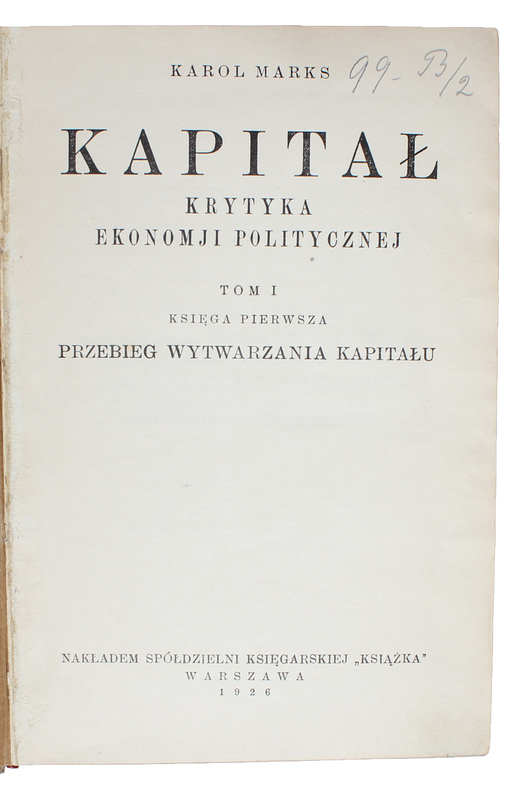
|
|
|
"MARX, CARLOS (+) FREDERICO ENGELS (+) JULIO GUESDE.
El Capital. Resumido y acompanado de un estudio sobre el socialismo científico por Gabriel Deville. Primera edición [Marx / Deville] (+) Socialismo Utopico y Socialismo Cientifico [Engels] (+) La Ley de Los Salarios y Sus Consecuencias [Guesde]. - [FIRST SPANISH EDITION OF THE MOST IMPORTANT ABRIDGED VERSION OF ""THE CAPITAL""]
Madrid, Ricardo Fé, 1887. 8vo. Contemporary brown half calf with gilt lettering and ornamentation to spine and red paper covered boards. Most leaves evenly browned (due to the quality of the paper) and some brownspotting to last few leaves. Overall a very good copy indeed of this otherwise fragile book. [Socialismo Utopico... :] pp. (1)-91, (1) + frontispiece of Engels" [La Ley de Los Salarios... :] pp. (1)-44 + frontiespiece of Guesde" [El Capital:] pp. (I)-LVI, 263 pp.
Ссылка продавца : 58427
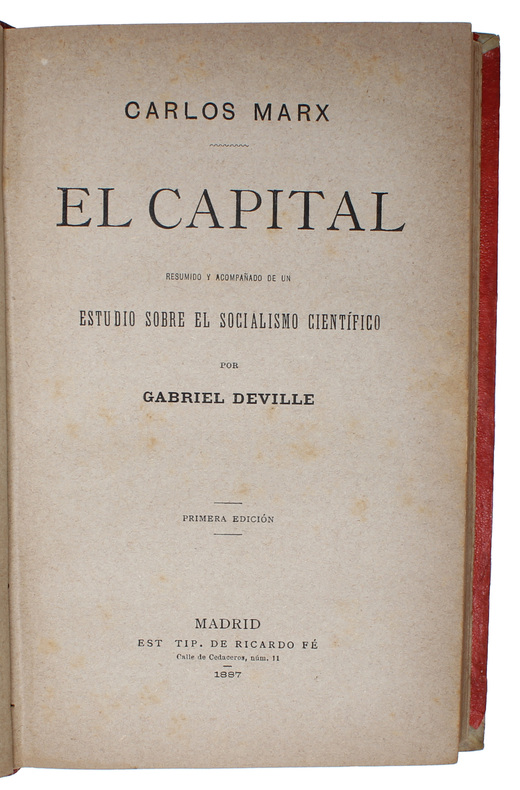
|
|
|
"[MARX, KARL].
The Civil War in France. Address of the General Council of the International Working-Men's Association. - [MARX' SEMINAL DEFENSE OF THE PARIS COMMUNE]
High Holborn, for the Council by Edward Truelove, 1871. Small 8vo. Near contemporary quarter cloth with silver lettering to front board. Binding with signs of use, but overall good. One closed marginal tear and title-page with a few brownspots, otherwise very nice and clean. 35 pp.
Ссылка продавца : 58474
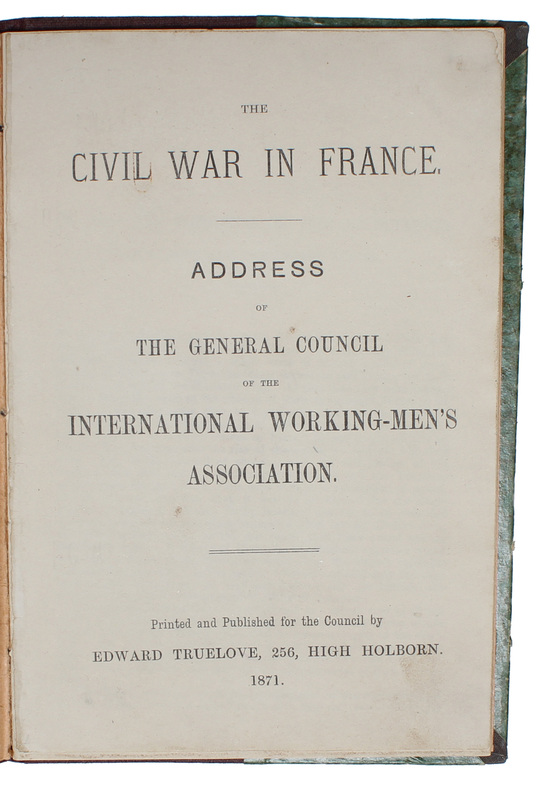
|
|
|
"MARX, KARL.
Kapitalut. Kritika na politicheskata ikonomiya. [i.e. Bulgarian ""Das Kapital""]. [Translated and introduction by Dimitar Blagoev] (+) Rech za svobodata na turgoviyata [i.e. Bulgarian: ""A speech on free trade""]. - [FIRST PARTIAL BULGARIAN TRANSLATION OF MARX'S 'DAS KAPITAL']
[Kapitalut:] Balchik, Izdanie na Krist'o Ivanov, 1905. [Speech On the Question of Free Trade:] Sofia 8vo. In contemporary red half calf. Extremities with wear. Previous owner's name in contemporary hand to upper part of both title-pages. Light browning throughout and a few occassional underlignings in text, mainly in ""A speech on free trade"". [Kapitalut:] XXXVIII, 122 pp. [Rech za...:] 27, (1).
Ссылка продавца : 58543
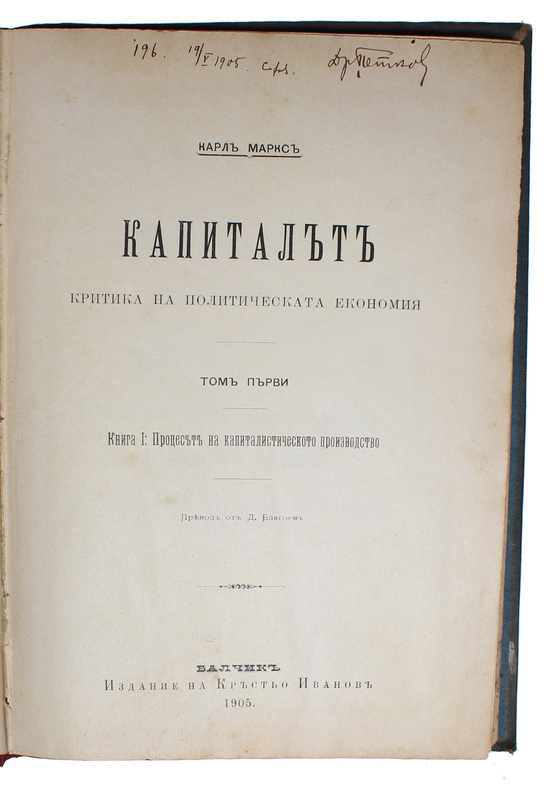
|
|
|
"MARX, KARL.
Zur Kritik der politischen Oekonomie. Erstes Heft [all that appeared]. - [THE BLUEPRINT FOR ""DAS KAPITAL"" - MAGNIFICENT ASSOCIATION-COPY]
Berlin, Franz Duncker, 1859. 8vo. Nice contemporary hafl calf with gilt lettering to spine. A bit of wear to extremities, markings after old label to front board and signs of vague damp staining to front board. A mostly faint damp stain to outer inner corner throrughout, but otherwise very nice. Title-page a bit dusty. Old library number (872) to front free end-paper and top of title-page and marginal pencil-annotations to a number of leaves. VIII, (2), 170 pp. Title-page with the ownership-signature of Alexander Appolonovich Manuilov to top of title-page and binding with his initials ""A. M."" in gold to the fot of spine.
Ссылка продавца : 58578
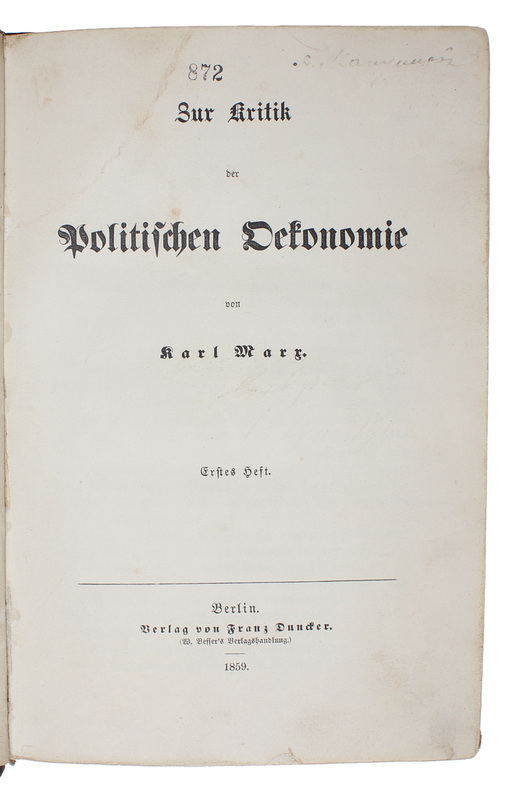
|
|
|
"ENGELS, FRIEDRICH & KARL MARX.
Die heilige Familie oder Kritik der kritischen Kritik. Gegen Bruno Bauer & Consorten. - [THE COLLABORATION THAT WOULD CHANGE THE WORLD]
Frankfurt a. M., 1845. 8vo. Contemporary black half calf. Professionally rebacked. Title-page somewhat dusty and re-hinged. VIII, 335, (1) pp.
Ссылка продавца : 58581
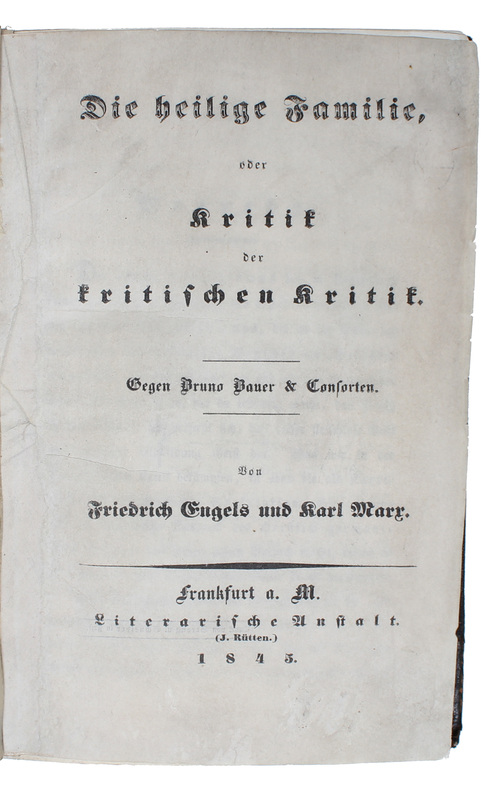
|
|
|
"MARX, KARL.
Der 18the Brumaire des Louis Napoleon [in: Die Revolution, eine Zeitschrift in zwanglosen Heften. Herausgegeben von J. Weydemeyer. Erstes Heft]. - [THE MOST IMPORTANT PROPOSITIONS IN THE MARXIST TEACHING ON THE STATE]
New-York, 1852. Bound in a later (ab. 1900) red full cloth binding with silver lettering to front board. A bit of wear to capitals, corners, and extremities. Front free end-paper with small repairs and strengthening. A couple of closed tears to blank outer margin of title-page (no loss and not affecting printing)Inner blank margins of the first few leaves strengthened (far from affecting text). Occasionally a few marginal notes. and underlinings. A near contemporary notice in Russian about the work has been inserted between the title-page and the preface. All in all a good copy with no major flaws. IV, (4), 62 pp.
Ссылка продавца : 58600
|
|
|
"RUGE, ARNOLD (edt.) - KARL MARX.
Anekdota zur neuesten deutschen Philosophie und Publicistik von Bruno Bauer, Ludwig Feuerbach, Friedrich Köppen, Karl Nauwerk, Arnold Ruge und einigen Ungenannten. 2 bde. [(Marx): Bemerkungen über die neueste preußische Censurinstruction. Von einem Rh... - [DEFINING THE ESSENCE OF REASON AS FREEDOM - MARX' DEBUT ARTICLE]
Zürich & Winterthur, Literarischen Comptoirs, 1843. 8vo. Bound in one nice later half calf binding in contemporary style with gilt title and blindstamped ornamentation to spine. Faded inscription of ""Eigenthus des Literar. Museum"" to both title-pages and last leaf of bot volumes. Stamps of the same Litarary Museum to volume 1, at both title-page, last leaf and a few leaves inbetween. Neat pencil annotations to a few leaves of volume 1. Neatly washed and with a few tiny closed tears to second gathering. A small spot to lower blank margin of pp. 195-8 of vol. 1. Contents generally clean and crisp. All in all a evry nice copy. IV, 320 + IV, 288 pp. [Marx' paper: Vol. I, pp. 56-88].
Ссылка продавца : 58875

|
|
|
"MARX, KARL.
Kapital. Poliitilise Ökonoomia Kriitika [i.e. German ""Das Kapital""]. - [FIRST ESTONIAN TRANSLATION OF MARX'S 'DAS KAPITAL']
Tallinn, Kirjastusühing ""Soprus"", 1936 4to. In contemporary half calf with gilt lettering to spine. Extremities with light wear and corners bumped. Housed in a nice full black cloth clamshell box with black leather title-label to spine with lettering in silver. Otherwise fine and clean. (8), 9-43, (3), 640 pp.
Ссылка продавца : 59261
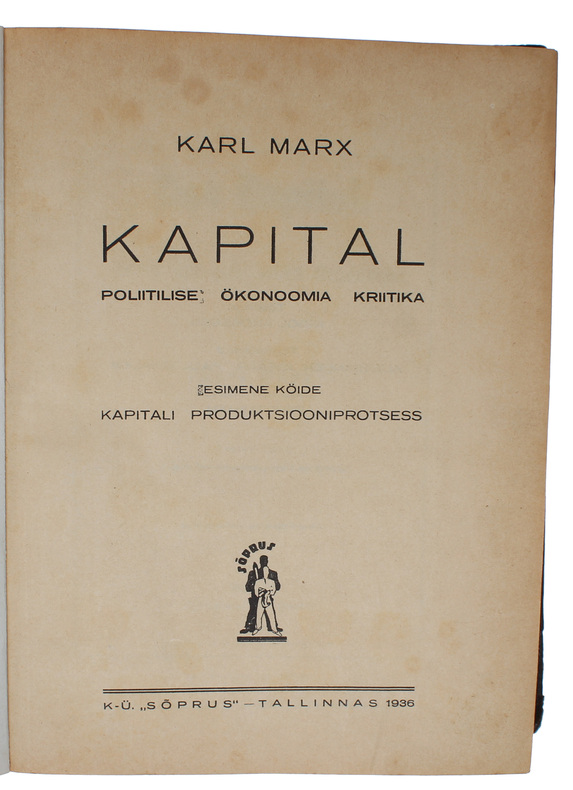
|
|
|
"MARX, KARL (+) HAYDAR RIFAT (translator).
Sermaye. [i.e. Turkish: ""Das Kapital""]. - [FIRST TURKISH EDITION OF THE MOST IMPORTANT ABRIDGED VERSION OF ""THE CAPITAL""]
Istanbul, Sirketi Mürettibye Matbaasi, 1933. 8vo. In a recent full black leather binding with four raised bands and gilt lettering to spine and front board. Blindtooled frames to front and back board. A fine and clean copy. (7), (1), (5)-305, (1), [errata-leaf] pp.
Ссылка продавца : 59547
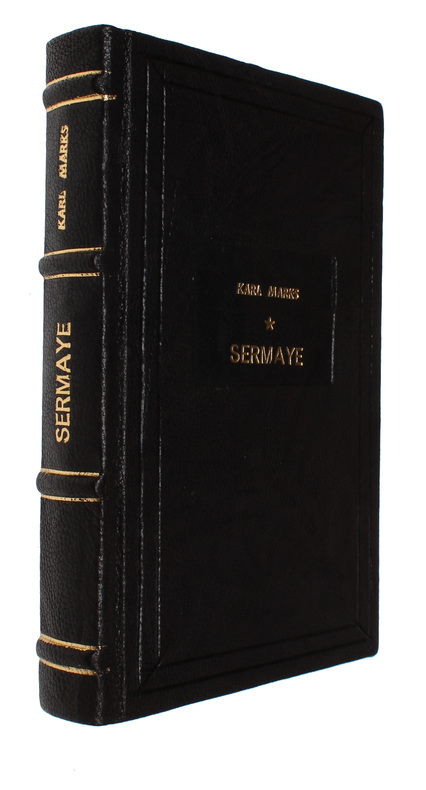
|
|
|
"MARX, KARL [Translated by:] P. RUMYANTSEV [Edited by:] A.MANUILOV.
Kritika nekotorykh polozhenii politicheskoi ekonomii. (i.e.: ""Zur Kritik der Politischen Oekonomie"", i.e.: ""A Contribution to the Critique of Political Economy""). - [FIRST RUSSIAN TRANSLATION OF THE BLUEPRINT FOR ""DAS KAPITAL"" ]
Moscow, Izdanie Vladimira Bonch-Bruevicha, 1896. 8vo. In a later modest black half calf binding with marbled boards. Traces of stamp to verso of front and back board. Title-page slightly rubbed. Occassional underlignings in text and margins. Pp. 145-146 reinforced in margin. Otherwise a fine copy. XII, (4), (1)-160 pp.
Ссылка продавца : 59587
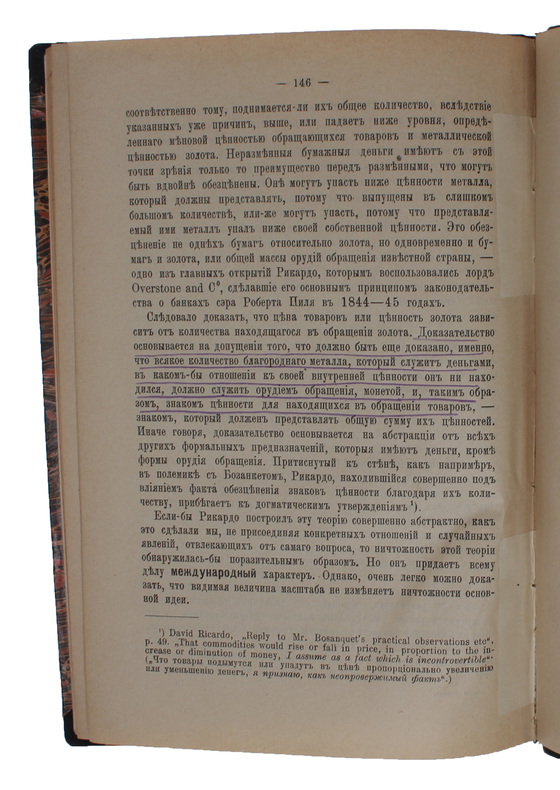
|
|
|
"MARX, KARL (+) HAYDAR RIFAT (translator).
Sermaye. [i.e. Turkish: ""Das Kapital""]. - [FIRST TURKISH EDITION OF THE MOST IMPORTANT ABRIDGED VERSION OF ""THE CAPITAL""]
Istanbul, Sirketi Mürettibye Matbaasi, 1933. 8vo. In contemporary full black cloth binding with gilt lettering to spine. Blindtooled frames to front and back board. Previous owner's name ""Hüsnû Hizlan"" in gilt lettering to front board. A fine and clean copy. (7), (1), (5)-305, (1), [errata-leaf] pp.
Ссылка продавца : 59614
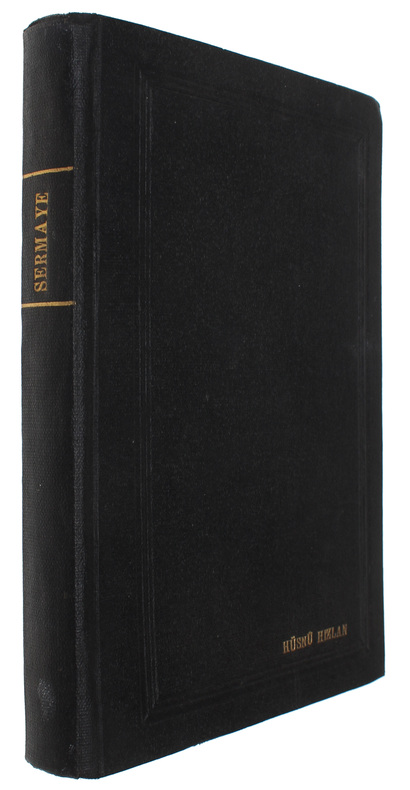
|
|
|
MARX, KAROL [KARL]. [Translators:] PAVOL MUSIL (+) JAN ROZNER.
Kapitál. Kritika politickej ekonómie. 3 vols. - [FIRST SLOVAKIAN TRANSLATION OF 'DAS KAPITAL']
Bratislava, Vydalo Slovenské vydavatel'stvo politickej literatúry, 1955 - 1958. 8vo. 4 volumes, all in publisher's original full cloth. Gilt lettering to spines and front boards and Marx in profile blind-stamped to front boards. A very fine and clean set. 918, (2) pp + fontiespiece of Marx 590, (2) pp 515, (4) pp 541, (4) pp.
Ссылка продавца : 59733
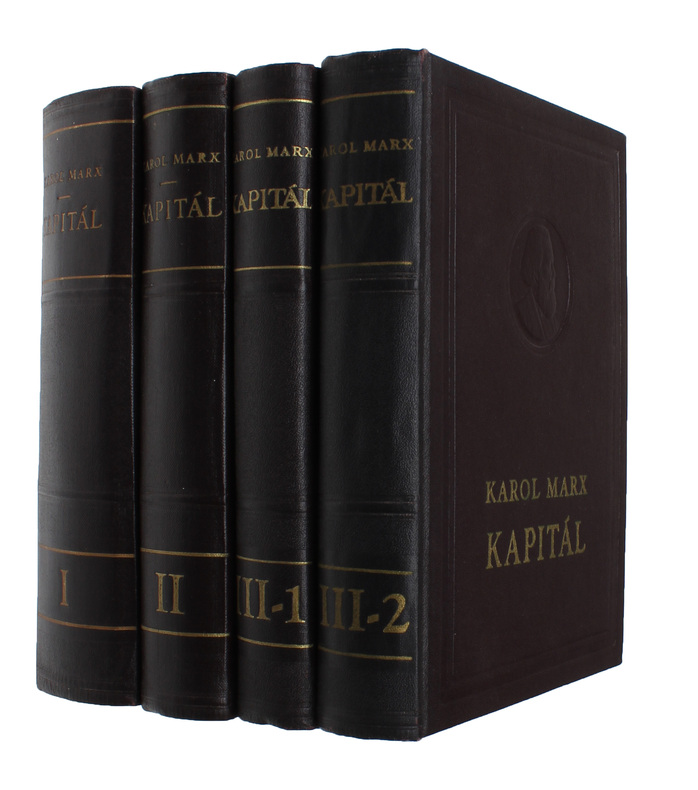
|
|
|
"MARX, K. (+). F. ENGELS.
Komunistički manifest [i.e. Croatian: ""Das Kommunistische Manifest""] - [RARE FIRST CROATIAN TRANSLATION OF THE COMMUNIST MANIFESTO]
Preveo M. Pijade (Belgrad), Biblioteka Marksizma-Lenjinizma, 1945. 8vo (195 x 145 mm). In the original printed wrappers. A few small nicks to wrappers and a few occassional light markings in margin. Otherwise a fine and clean copy. 64, (3) pp.
Ссылка продавца : 59904
|
|
|
"MARX, KARL.
Kapitalet. Kritik av den politiska ekonomin. I svensk oversättning av Rickard Sandler. 3 vols. - [FIRST SWEDISH EDITION OF MARX' ""CAPITAL""]
Stockholm, Tidens Förlag, 1930-31. 8vo. Three volumes, all in the original publisher's uniform half calf bindings with gilt lettering to spines. Extremities, especially capitals, with a bit of wear. Internally very fine and clean. XXII, (2), 740" XXIII, (1), 479, (1)" XXV,(1), 836, (2) pp.
Ссылка продавца : 59980
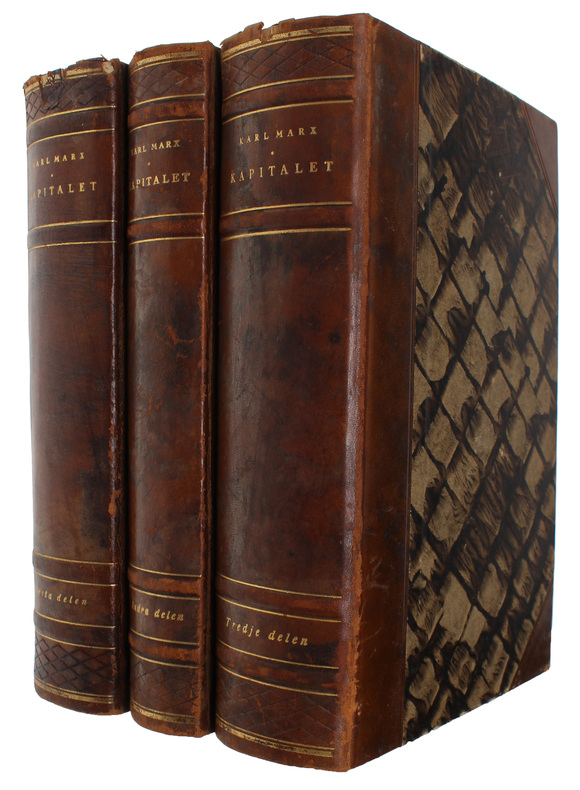
|
|